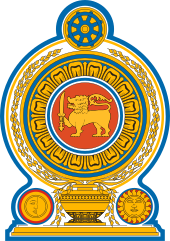Personal Data Protection Act (Sri Lanka)
| Personal Data Protection Act, No. 9 of 2022 | |
|---|---|
 | |
| Parliament of Sri Lanka | |
| |
| Citation | Personal Data Protection Act, No. 9 of 2022 |
| Territorial extent | Worldwide |
| Enacted by | Parliament of Sri Lanka |
| Enacted | March 9, 2022 |
| Signed by | Speaker of the Parliament |
| Signed | March 19, 2022 |
| Effective | July 17, 2023 (Part V) December 1, 2023 (Parts VI, VIII, IX, X) March 18, 2025 (Parts I, II, III, VII) |
| Administered by | Data Protection Authority of Sri Lanka |
| Legislative history | |
| Bill title | Personal Data Protection Bill |
| Bill citation | Personal Data Protection Bill |
| Introduced by | Minister of Technology |
| Introduced | November 25, 2021 |
| First reading | January 20, 2022 |
| Second reading | March 9, 2022 |
| Third reading | March 9, 2022 |
| Keywords | |
| Data protection, Privacy, Personal data | |
| Status: Not fully in force | |
The Personal Data Protection Act, No. 9 of 2022 (abbreviated PDPA) is a comprehensive data protection law enacted to regulate the processing of personal data in Sri Lanka.[1] The Act aims to protect the privacy of individuals, establish rights for data subjects, and impose obligations on data controllers and processors.
Background
[edit]The Act was passed by the Parliament of Sri Lanka in 2022[2] to address the growing need for data protection in the digital age. It is designed to safeguard personal data while allowing for legitimate data processing activities.
Key features
[edit]Scope and application
[edit]The Act applies to the processing of personal data:
- Wholly or partly within Sri Lanka
- By controllers or processors domiciled or established in Sri Lanka
- Related to the offering of goods or services to data subjects in Sri Lanka
- Involving the monitoring of data subjects' behavior in Sri Lanka
Data Protection Authority
[edit]The Act establishes the Data Protection Authority of Sri Lanka as the primary regulatory body responsible for enforcing the law and promoting data protection practices.
Rights of data subjects
[edit]The Act grants several rights to data subjects, including:
- Right of access to personal data
- Right to rectification of inaccurate data
- Right to erasure ("right to be forgotten")
- Right to object to processing
- Right to withdraw consent
- Right to review automated decision-making
Obligations of data controllers and processors
[edit]Key obligations include:
- Ensuring lawful processing of personal data
- Implementing data protection management programs
- Conducting data protection impact assessments in certain cases
- Appointing Data Protection Officers under specific circumstances
- Notifying the Authority and affected individuals of personal data breaches
Cross-border data transfers
[edit]The Act regulates the transfer of personal data outside Sri Lanka, requiring adequate protection measures or specific conditions to be met.
Special categories of personal data
[edit]The Act provides additional protections for sensitive personal data, including data revealing racial or ethnic origin, political opinions, religious beliefs, health data, and biometric data.
Penalties
[edit]The Act empowers the Authority to impose penalties for non-compliance:
- For the first instance of non-compliance, a penalty not exceeding ten million rupees may be imposed.
- For subsequent non-compliances, an additional penalty of twice the amount imposed for the previous non-compliance may be levied.
The Authority considers several factors when determining penalties, including the nature and duration of the violation, the number of data subjects affected, and any actions taken to mitigate damages.
Implementation timeline
[edit]The Act is being implemented in phases:
- July 17, 2023: Part V (establishing the Data Protection Authority) came into effect.[3]
- December 1, 2023: Parts VI (Director-General and staff of the Authority), VIII (Fund of the Authority), IX (Miscellaneous), and X (Interpretation) came into effect.[4]
- March 18, 2025: Parts I (Preliminary), II (Rights of Data Subjects), III (Controllers and Processors), and VII (Penalties) will come into effect.[4]
This phased implementation allows organizations and the government time to prepare for full compliance.
Impact and significance
[edit]The Personal Data Protection Act represents a significant step in Sri Lanka's digital governance framework. It aligns Sri Lanka's data protection regime with international standards, potentially facilitating cross-border data flows and digital trade. The Act is expected to enhance trust in digital transactions and services while promoting responsible data handling practices across public and private sectors.
See also
[edit]References
[edit]- ^ "Personal Data Protection Act, No. 9 of 2022" (PDF). Parliament of Sri Lanka. 19 March 2022.
- ^ "Personal Data Protection Bill passed with amendments". News First. 9 March 2022.
- ^ "Gazette No. 2341/59" (PDF). documents.gov.lk. 19 July 2022.
- ^ a b "Gazette No. 2366/08" (PDF). documents.gov.lk. 29 December 2023.
